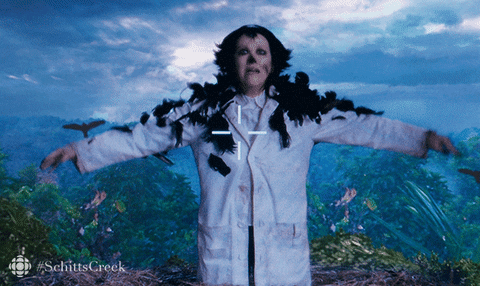It’s my life mission to befriend a crow
I have a murder that visits my yard almost every day. I have a large bowl for water, I give them cheap dry cat food, and on occasion unsalted peanuts. Hope you can make some friends
Me too, though I just leave out hockey masks and spare saws for him to play with
I am only a little concerned that befriending a crow would drive a wedge between me and my dog, who would certainly see that friendship a betrayal.
Should be pretty doable if you keep a little packet of seeds on your person
I wanna try at some point, but my work schedule means I probably can’t make the time commitments.
I’ve made dozens of them in the last few years. It’s awesome. They follow me on walks with my dog, and hang out sometimes near my home.
Isn’t there a movie about that?
Wow. How do they fit so much smart into such a tiny space?
Their neurons are smaller and more tightly-packed
Moore’s law says neurons will halve in size every two years
I imagine it’s the combination of evolutionary pressures of being a scavenger and having to fly. Since crows tend to steal food from dangerous animals like wolves, they need to be able to react quickly and to be able to predict behavior of other animals. This selects for intelligence and a theory of mind. Meanwhile, flying means you have to keep things lean.
It’s also worth noting that the human brain has massive redundancy in it. For example, there was a case of a guy in France who was missing 90% of the brain due to an extreme case of hydrocephalus. He didn’t even realize there was anything wrong with him until he went to the doctor for some unrelated problem, only to be referred to a specialist because his head seemed a bit too large.
In light of that, crows having high levels of intelligence doesn’t seem that weird at all.
deleted by creator
What if they are
Like in the same way a child thinks their super smart
deleted by creator
Shouldn’t they start killing us for destroying the planet?
Planet of the
apescrows
Crows are self-aware just like humans
“Oh no, is my plumage too dark? Were the other crows laughing with me or at me? Is my crowing too high pitched? Was that raven offended when I mistook him for a crow?”
Ravens are my favorite animals! They’re so cool.

One of my pastimes as an incredibly lonely teenager was just observing jackdaws, crows and magpies. You can tell that they actually think before acting which is fascinating.
Also jackdaws have very pretty eyes.
There’s a squad of crows living in my neighborhood and watching them set up their lil community of nests has been an amazing time
Same for Parrots, corvids and parrots are in the IQ level of dolphins and big simios. But there are also other animals with self awareness (mirror test), eg Elephants, Manta Rays, Octopus and even Ants. Many animals are much more intelligent than was thought a few years ago and self-awareness is surely present in most of them and also a minimum of intelligence, because they are an essential faculties for the will to survive.
Even bees are smart enough to recognize and difference a human face, jumping spiders can plan different strategies to hunt their prey
https://tube.kuylar.dev/watch?v=UDtlvZGmHYk
https://tube.kuylar.dev/watch?v=H4JfRrOPKlE
https://www.animalcognition.org/2015/04/15/list-of-animals-that-have-passed-the-mirror-test/
this is very interesting but how the fuck did they figure this out? i skimmed the article and its vague on what would be the coolest details.
One common test is the famous “mirror test” where an animal is given some problem that can only be solved by using its own reflection in a mirror for reference, such as a study involving an Australian ant. They put a blue dot made of felt (I think) on the ant’s head behind the antennae, and watched the ant clean itself once it saw that it’s reflection had a weird blue thing on its head. But I don’t know if there are other tests for “self awareness”
deleted by creator
Right, if an animal passes the test that’s a strong indication of self awareness, but if it doesn’t then consciousness cannot be ruled out. I would imagine most animals are self aware at least on some level because being able to model oneself within your environment is a useful property. Any organism with a relatively sophisticated internal model would naturally have itself as part of its model.
deleted by creator
I never really understood why the default assumption is that consciousness is something unique to humans and we should default to assuming other animals are not conscious as opposed to the other way around.
id imagine consciousness must be on a spectrum instead of an is/is not thing
deleted by creator
I very much agree.
The mirror test is certainly somewhat debatable in determining the degree of self-awareness and intelligence. For this reason, today it is determined not only with this, but with a set of tests that includes the general ability to solve problems to determine the intellectual capacity of an animal. It is always the question if the animal does not correspond to the mirror test, if it is due to lack of understanding, lack of interest or other reasons, little childs also don’t pass the mirror test. It is to find out if the animal knows exactly what it is doing.

My dad was telling me earlier about how these crows have been hanging around our house and he saw some squirrels trying to chase them off.
I think the real question is, given how smart they are, and that they know they are smart, and that they know we are smart:
why don’t they worship us like Gods and adorn us with crow gifts
Well they aren’t just about to worship anyone, but they do.
Corvids in general are incredibly intelligent birds!! They’ve been known to solve puzzles that a toddler would struggle with, and have been known to have funerals for their dead, create artwork, and utilise statistical logic, have favourite tools and many other things!
experiment proposal:
a population of crows in a shared space.
one crow is selected and brought to another area where the rest cannot see or hear what happens.
In the other area, the crow is placed into a box where a distinctive sound plays, and then a spurt of cold water sprays. Alternatively, something that is not injurious, but annoying and unpleasant.
The crow is then removed from the box and marked non-invasively somehow, such as with nontoxic washable dye.
The crow is finally put back into the same space with the other crows.
Another crow is then selected from the population, ensuring that it is not one that has been marked, and the process is repeated.
IS THERE a point at which the crows begin to respond pre-emptively to the distinctive sound that foreshadows the unpleasant stimulus?
If so, how long does this change of behavior take to manifest in individuals who did not directly experience the unpleasant stimulus?
The goal is to see if a crow will TELL the others about its experiences and what to expect, which requires the ability to communicate abstract and hypothetical information.
i would expect that if we performed this experiment on cats and dogs, etc, we would never actually see individuals from the general population learning to anticipate what’s coming via abstract communication from their peers… but I do expect that such information WOULD eventually be taught to the entire community.
has such an experiment already been performed?
That’s a reasonable design. The result would be interesting and may raise more questions than it answers. That is a good thing.
I don’t think this design would conclusively prove they were engaging in abstract communication, but that would take many experiments of similar scope.
A sceptic could say the unconditioned group reaction was a result of social awareness of the reaction of the conditioned crows. Sort of a collective freak out based on the immediate reaction of the marked individuals.
Regardless, I hereby tender my application to be colony manager of the research group. Murder Manager is the title I would choose.
Maybe you could instead make it a puzzle type of thing, like “you have a set of 4 buttons, only 1 gives you a treat, and the crow can only choose 1 button”. Then see what happens
It could be explained by simply an increasing level of stress in the murder. Stress is transmissible. How would you control for that?
deleted by creator
maybe stress out a different group of crows and see how they respond
Someone get this man funding. I want. No need to know!
Paywall : (
Crows Are Self-Aware Just Like Humans, And They May Be as Smart as Gorillas
Caroline Delbert
5 - 6 minutes
- In a 2020 study, crows performed a complex task that involved hundreds of firing sensory analytical neurons.
- Crows can do jobs, share knowledge, and even ritualistically mourn their dead.
- Recent research suggests crow brains tightly pack neurons to help make them smart.
Crows are extremely intelligent. They can use tools to get what they want, like New Caledonian crows in a single South Pacific island of the same name, which shape twigs into hooks to catch grubs from rotting logs. And according to new research, crows are even smarter than we thought.
****Crows and other corvids (a family of birds that includes ravens and magpies) “know what they know and can ponder the content of their own minds,” according to a 2020 study in Science**. **This is considered a cornerstone of self-awareness and shared by just a handful of animal species beside humans, such as monkeys and great apes. Crows can also use their complex brains to find creative solutions, such as dropping nuts on the road so passing cars can crack them open, for example.
But do they have true consciousness?
Crows Have Brains Packed With Neurons
The ability to think through a problem and work out an answer may be due to crows possessing a high number of brain cells that process information. This trait appears not only in humans, but in non-human primates, too. A study published in the Journal of Comparative Neurology in January 2022 comparing corvid brains with those of chickens, pigeons, and ostriches found that corvid brains have more tightly packed neurons—between 200 and 300 million neurons per hemisphere—enabling efficient communication between the brain cells. Crow intelligence is at least on par with some monkeys, and in fact, may be closer to that of great apes (like gorillas), according to a 2017 study published in Current Opinion in Behavioral Sciences.
Evolution Gave Crows Great Ability to Reason
In the 2020 study, scientists put crows through a series of puzzling tasks. The researchers measured neural activity in different kinds of neurons with the goal of tracking how crows were sensing and reasoning through their work. They sought to study a specific kind of thinking, called sensory consciousness, and they chose birds in particular as representative of a branching point in the evolutionary tree of life. The task is simple, but involves some high-level brain stuff, as described in the study:
After the crow initiated a trial … a brief visual stimulus of variable intensity appeared… After a delay period, a rule cue informed the crow how to respond if it had seen or had not seen the stimulus. [A] red cue required a response for stimulus detection (“yes”), whereas a blue cue prohibited a response for stimulus detection.
The researchers write that sensory consciousness is the ability to have subjective experiences that can be “explicitly accessed and thus reported,” and that it comes from brains that have evolved over time. Consciousness is associated primarily with the primate cerebral cortex. Bird brains are different, “since they diverged from the mammalian lineage 320 million years ago,” the researchers write.
However, the crows performed in a way that affirms their sensory consciousness, which scientists in the 2020 study say could mean the “neural correlates of consciousness” date back to at least the last time birds and mammals shared that brain section:
To reconcile sensory consciousness in birds and mammals, one scenario would postulate that birds and mammals inherited the trait of consciousness from their last-common ancestor. If true, this would date the evolution of consciousness back to at least 320 million years when reptiles and birds on the one hand, and mammals on the other hand, evolved from the last common stem-amniotic ancestor.
In an analysis in the same issue of Science, another researcher, Suzana Herculano-Houzel of Vanderbilt University, makes a critique of the study’s hypothesis. The structure being studied, she says, could resemble another structure because of physical properties more than a shared evolution or an indication of extremely early consciousness. The size of the structures matter a great deal, too.
“[T]he level of that complexity, and the extent to which new meanings and possibilities arise, should still scale with the number of units in the system,” Herculano-Houzel explains. “This would be analogous to the combined achievements of the human species when it consisted of just a few thousand individuals, versus the considerable achievements of 7 billion today.”
Either way, crows have bird brains they can be proud of.

Caroline Delbert is a writer, avid reader, and contributing editor at Pop Mech. She’s also an enthusiast of just about everything. Her favorite topics include nuclear energy, cosmology, math of everyday things, and the philosophy of it all.
This content is imported from OpenWeb. You may be able to find the same content in another format, or you may be able to find more information, at their web site.
Ain’t nothing as smart as a gorilla

















